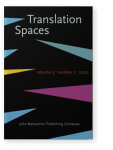Vol. 9:2 (2020) ► pp.224–254
Translator training outdoors
Before the COVID-19 pandemic, there was no real need to integrate outdoor education into translation studies, as it was easy to balance indoor and outdoor time before and after translation classes. However, the lockdown has deeply affected not only learning but also the mental and physical health of teachers and students, and outdoor education may contribute to recovery afterwards. The proposals in this paper focus on the benefits that being outdoors has for physical health, knowledge, social relations, mental health and attitude to learning. Moreover, being outdoors allows for social distancing. The activities presented in this paper are related to specialized translation, sight translation, simultaneous interpreting, consecutive interpreting, role-play interpreting, translation theory, song translation, theatre translation, machine translation post-editing, translators’ employability, translation project management and, last but not least, intermodal transcreation.
Article outline
- 1.Introduction
- 2.Outdoor education
- 2.1Benefits of outdoor education
- 3.A rationale for outdoor translation education
- 4.Ten outdoor translator training activities
- 4.1Specialized translation activity: “The plant finder”
- 4.2Machine translation post-editing activity: “MTPE on the Go”
- 4.3Literary translation: “Translation of song lyrics”
- 4.4Simultaneous interpreting: “A free tour of the university campus”
- 4.5Consecutive interpreting activity: “Outdoor role-play interpreting”
- 4.6Translation theory activity: “Socratic method in the translation agora”
- 4.7Intermodal transcreation activity: “The transcreated interview”
- 4.8Outdoor sight translation activity: “Theatre translation”
- 4.9Translator employability: “A coffee with … a translation service provider”
- 4.10Translation project management: “Ten essential project management skills”
- 5.Conclusion
- Acknowledgements
-
References
